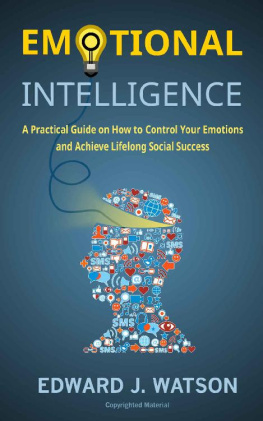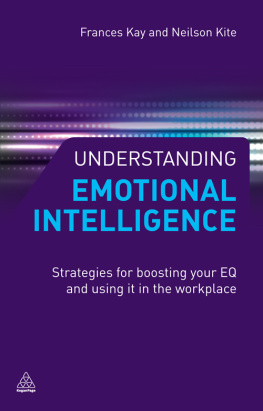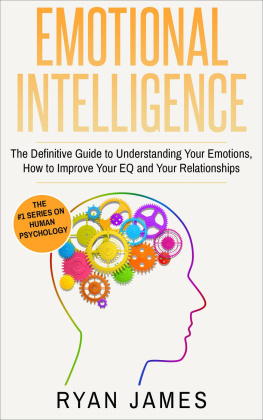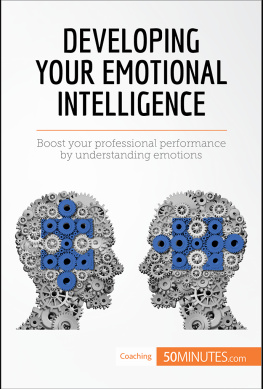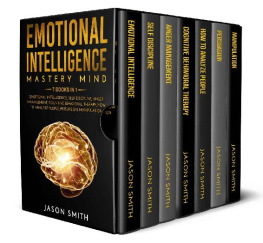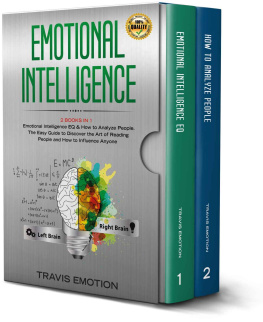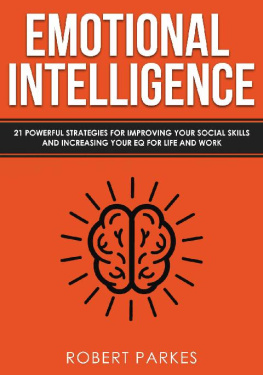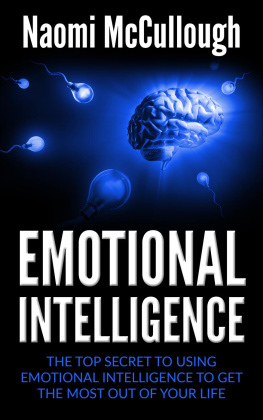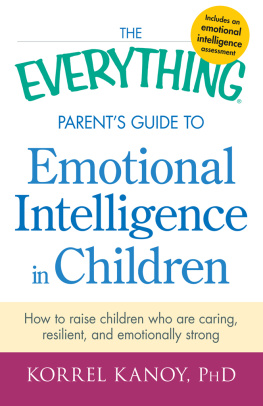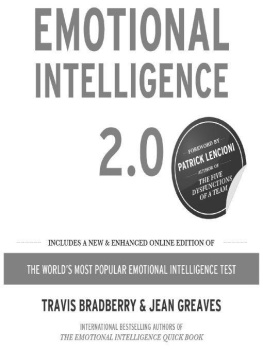Emotional Intelligence
A Practical Guide On How to Raise Your EQ and Achieve Lifelong Social Success
By
Edward J. Watson
Copyright 2016 - All rights reserved.
In no way is it legal to reproduce, duplicate, or transmit any part of this document in either electronic means or in printed format. Recording of this publication is strictly prohibited and any storage of this document is not allowed unless with written permission from the publisher. All rights reserved.
The information provided herein is stated to be truthful and consistent, in that any liability, in terms of inattention or otherwise, by any usage or abuse of any policies, processes, or directions contained within is the solitary and utter responsibility of the recipient reader. Under no circumstances will any legal responsibility or blame be held against the publisher for any reparation, damages, or monetary loss due to the information herein, either directly or indirectly.
Respective authors own all copyrights not held by the publisher.
Legal Notice:
This book is copyright protected. This is only for personal use. You cannot amend, distribute, sell, use, quote or paraphrase any part or the content within this book without the consent of the author or copyright owner. Legal action will be pursued if this is breached.
Disclaimer Notice:
Please note the information contained within this document is for educational and entertainment purposes only. Every attempt has been made to provide accurate, up to date and reliable complete information. No warranties of any kind are expressed or implied. Readers acknowledge that the author is not engaging in the rendering of legal, financial, medical or professional advice.
CONTENTS
Conclusion
FREE GIFT
Get Your 5-Part Email Series On:


>>Click To Download For FREE<<
Introduction
If all these years you blamed intelligence quotient for your low performance and lack of success in any field, then its time to change your perception. Yes, the role of intelligence cant be denied, but the pivotal role is played by emotional intelligence. Whether its your management skills in the work place or social interaction skills in your social circle, emotional intelligence always stands ahead in deciding your success in these areas.
By turning every page of this book, you will begin to understand a plethora of ways to develop your emotional intelligence, which is connected to the attainment of overall success in your life. Whether its controlling your emotions or showing excellent performance at the workplace, a good level of emotional intelligence can help you in attaining all your goals to a large extent.
Show a little patience and go on reading as well as practicing these skills to improve emotional intelligence. I am sure it will certainly lead to the complete transformation of your personality. It will fill your life with positivity and your achievements will not remain limited to the accomplishment of some materialistic goals, but a changed you which would grab everyones attention.
Chapter 1
Emotional Intelligence- A Brief Introduction
To understand the significance of emotional intelligence in our lives, we first need to understand what it means exactly, and how it can bring a positive change in our personality which will lead to easy attainment of our life goals.
What is Emotional Intelligence?
Emotional intelligence may be defined as your ability to determine and manage your emotions properly. It also includes managing the emotions of others around you. The three skills which constitute emotional intelligence are
1. Being aware of the emotions in yourself and in those around you. This is defined as Emotional Awareness.
2. Your ability to manage or control the various emotions inside you, also the skill of managing the emotional state of the person or persons around you.
3. The skill of harnessing these emotional states of mind and applying them towards the achievement of a positive outcome or resolution of a situation.
The term Emotional Intelligence (EI) or Emotional Quotient (EQ) was coined by two American researchers, Peter Salovey and John Mayer. The book, Emotional Intelligence written by Dan Goleman popularized the term globally.
The researchers defined emotional intelligence as
- The ability to perceive, interpret and manage our own emotions
- The ability to perceive, interpret and influence the emotions of other persons
To consider things from a practical point of view, our emotions can be the driving force behind behavior patterns, and influence people around us positively or negatively. You can acquire this skill of managing your emotions - along with those around you especially under difficult or under-pressure situations.
We often make the mistake of confusing emotional intelligence with other personality attributes. So, we need to understand the differences between emotional intelligence and other personality traits.
Emotional Intelligence Myths
Many accounts of emotional intelligence often associate this term with a lot of unrelated personality characteristics. Emotional intelligence is not calmness under pressure, agreeable nature, optimism and happiness. All these qualities are important aspects of your character, but these have no relation to either intelligence or emotion and cannot be associated with emotional intelligence.
More Facts about Emotional Intelligence
You can learn more facts about emotional intelligence below; how to develop this as a skill and its important contribution towards developing your performance.
Emotional Intelligence may also be termed as Emotional Smartness
The obvious and generally prevalent notion about people with high Intelligence Quotient (IQ) will be the best performers was not validated with statistics. Practical data showed that 70% of the outstanding performers were people with average IQs. This also proved that high IQ cannot be the sole determining factor of a persons success. The advent of emotional intelligence in this scenario solved the issue; now decades of research has proved that this skill is what the performers have in abundance and leads to their success.
The emotional intelligence in us is not a quantifiable trait. It is the sum of the different methods that we instinctively use to solve different situations in your life. It governs how we behave generally, our social interactions, our decision-making ability and our ability to steer a problem or situation towards a positive resolution. The four intrinsic skills make up emotional intelligence may be paired under two competencies; social and personal.
Social Competence is about the other persons you interact with in your professional and personal life. This is about your awareness of their emotional state at a given moment and in general. It is also about your skill of managing relationships based on the emotional awareness of the other person.
Social Awareness is the skill of discerning accurately the emotional state of another person. You are able to judge the direction of events from your awareness of the emotional condition of that person.
Relationship Management stems from the awareness of another persons emotional state. From this awareness, you are able to manage interactions with that person in a successful manner. This also has long-term implications on the relationship you have with that person.

